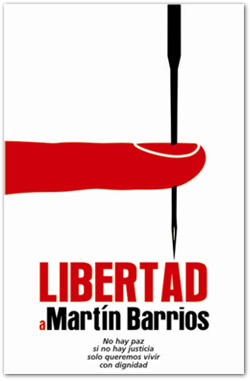WELCOME TO THE ARCHIVE (1994-2014) OF THE MAQUILA SOLIDARITY NETWORK. For current information on our ongoing work on the living wage, women's labour rights, freedom of association, corporate accountability and Bangladesh fire and safety, please visit our new website, launched in October, 2015: www.maquilasolidarity.org
February 5, 2006
 On December 29, 2005 Martin Barrios Hernández, President of the Mexican Human and Labour Rights Commission of the Tehuacan Valley, was arrested by the intelligence division of the Puebla state police and transported from his home city of Tehuacan to the state capital of Puebla where he was held in state prison. The arrest came exactly two years after Barrios was kidnapped and beaten by unknown assailants.
On December 29, 2005 Martin Barrios Hernández, President of the Mexican Human and Labour Rights Commission of the Tehuacan Valley, was arrested by the intelligence division of the Puebla state police and transported from his home city of Tehuacan to the state capital of Puebla where he was held in state prison. The arrest came exactly two years after Barrios was kidnapped and beaten by unknown assailants.
Barrios was accused of blackmail, based on a charge filed by Tehuacan maquila owner Lucio Gil Zarate. In Mexico, there is no possibility of posting bail when facing blackmail charges, and a guilty verdict could have resulted in a 2-10 year prison term.
According to Barrios, the charge was completely groundless, since he was attending an assembly at a local church at the time and date he was alleged to have attempted to blackmail Mr. Gil.
Barrios' only contact with Mr. Gil's company was in carrying out his responsibilities as a human rights advocate in regards to the severance pay owed to 163 workers unjustly fired by Mr. Gil. Barrios and the Mexican Human and Labour Rights Commission had been providing advice and assistance to workers employed at the Calidad de Confexiones maquila, which is owned by Mr. Gil.
The Commission was providing advice and assistance to workers employed at the Calidad de Confexiones maquila, which is owned by Mr. Gil. In early November, 2005, the Commission assisted workers in filing a complaint before the local Conciliation and Arbitration Board, charging the employer with worker rights violations. On November 10, Gil signed an agreement to resolve the outstanding issues, but, according to the Commission, had failed to comply with the agreement. On November 22, 2005, Gil fired all 163 workers who had been part of the original complaint.
The workers responded to the firings by staging peaceful protests outside the local offices of the Conciliation and Arbitration Board, the FROC-CROC (an "official" union that has failed to defend the workers' rights), and Mr. Gil's home, demanding the severance pay they were owned.
Despite the fact that the blackmail charge against Barrios was filed on December 16, he was not informed of the charges until December 29 when he was picked up by the police without warning outside his home as he was going to assist a maquila worker.

Maquila workers protesting in front of the "Cereso de Puebla" where Martin is being detained (January 4)
The charge against Martin was filed on the same day as independent journalist, Lydia Cacho, was arrested by Puebla state police in Cancun and transported to Puebla on defamation charges brought by maquila owner Kamil Nacif, Mexico's denim king concerning allegations that he was involved in a child prostitution ring. The improper out-of-state arrest was widely condemned by human rights and journalists' organizations. Barrios was publicly supporting Cacho.
Gil was a subcontractor for AZT, an apparel company in which Nacif is a part owner. Nacif is also a part owner of in the Tarrant Apparel Group, which closed its factories in 2003 after workers tried to organize an independent union at the Tarrant Ajalpan factory. The Commission provided advice and support to Tarrant workers who lost their jobs as a result of the factory closures. The US and Canadian labour ministries and the International Labour Organization (ILO) have issued reports documenting violations of worker rights in the Nacif-owned factory.
According to the Commission, Martin's arrest was part of an ongoing campaign by maquila owners in the Tehuacan region to discredit and obstruct the work of the Commission. Maquila owners in Tehuacan have made public accusations against Martin and the Commission, charging them with organizing protests and strikes that discourage foreign investment in order to blackmail the owners.
Barrios, who is also an advisor to the Mexican Federal Electoral Institute in Tehuacan, is internationally known as a defender of worker, indigenous and environmental rights in Tehuacan, one of Mexico's major apparel producing regions. In 2005 the Commission was awarded the prestigious Tata Vasco human rights award by Mexico's Jesuit universities. Barrios is also a co-author of "Tehuacan: Blue Jeans, Blue Waters and Worker Rights," a joint publication of the Commission and MSN documenting environmental and worker rights violations in Tehuacan's garment maquila industry.